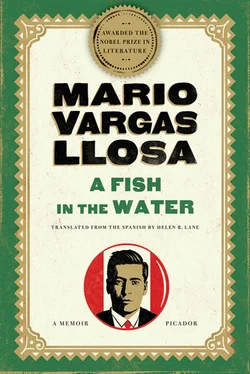Mario Vargas Llosa - A Fish in the Water - A Memoir
Здесь есть возможность читать онлайн «Mario Vargas Llosa - A Fish in the Water - A Memoir» весь текст электронной книги совершенно бесплатно (целиком полную версию без сокращений). В некоторых случаях можно слушать аудио, скачать через торрент в формате fb2 и присутствует краткое содержание. Год выпуска: 2015, Издательство: Macmillan, Жанр: Биографии и Мемуары, на английском языке. Описание произведения, (предисловие) а так же отзывы посетителей доступны на портале библиотеки ЛибКат.
- Название:A Fish in the Water: A Memoir
- Автор:
- Издательство:Macmillan
- Жанр:
- Год:2015
- ISBN:нет данных
- Рейтинг книги:3 / 5. Голосов: 1
-
Избранное:Добавить в избранное
- Отзывы:
-
Ваша оценка:
- 60
- 1
- 2
- 3
- 4
- 5
A Fish in the Water: A Memoir: краткое содержание, описание и аннотация
Предлагаем к чтению аннотацию, описание, краткое содержание или предисловие (зависит от того, что написал сам автор книги «A Fish in the Water: A Memoir»). Если вы не нашли необходимую информацию о книге — напишите в комментариях, мы постараемся отыскать её.
is a twofold book: a memoir of one of Latin America's most celebrated witers, beginning with his birth in 1936 in Arequipa, Peru; and the story of his organization of the reform movement which culminated in his bid for the Peruvian presidency in 1990.
A Fish in the Water: A Memoir — читать онлайн бесплатно полную книгу (весь текст) целиком
Ниже представлен текст книги, разбитый по страницам. Система сохранения места последней прочитанной страницы, позволяет с удобством читать онлайн бесплатно книгу «A Fish in the Water: A Memoir», без необходимости каждый раз заново искать на чём Вы остановились. Поставьте закладку, и сможете в любой момент перейти на страницу, на которой закончили чтение.
Интервал:
Закладка:
This is not something that I lose sleep over. And perhaps being so unpopular will enable me in the future to dedicate all my time and energy to writing, something at which — I touch wood — I trust that I am less inept than I am at undesirable (yet indispensable) political action.
My last reflection, in this book that has been difficult to write, is not optimistic. I do not share the broad consensus that appears to exist among Peruvians, that through the two electoral processes held in Peru after April 5—one for a Constituent Congress and one for a new role for town councils — legality has been reestablished and the government has recovered its democratic credentials. On the contrary, I think that these measures have served, rather, to make Peru go backward politically and that, with the blessing of the Organization of American States and many Western foreign offices, there has been restored in the country, with just a slight touch of makeup, the very old authoritarian tradition: that of caudillos, that of military power over civilian society, that of force and the intrigues of a coterie over institutions and the law.
Since April 5, 1992, an era of confusion and of notable paradoxes has begun in Peru, one that is very instructive as regards the unpredictability of history, its slippery nature and its surprising zigzags. A new antistate and anticollectivist mentality has spread in vast sectors, infecting many who, in 1987, courageously fought for the nationalization of the financial system and now enthusiastically support privatizations and the opening up of the economy. But how can one not deplore that this advance is weighed down by a simultaneous popular repudiation of political parties, of institutions, of the system of representative government and its autonomous powers that supervise and balance each other, and worse still, by the enthusiasm of vast sectors for authoritarianism and the providential caudillo? What purpose is served by the salutary reaction of the citizenry against the moth-eaten traditional political parties, if it tolerates the enthronement of that aggressive lack of culture that goes by the name of chicha culture, that is to say a contempt for ideas and morality and its replacement by shoddiness, vulgarity, con games, cynicism, jargon, and gibberish, which, to judge by the municipal elections of January 1993, appear to be the attributes most appreciated by the “new Peru”?
The support for the regime is based on a tissue of contradictions. The entrepreneurial sector and the right hail in President Fujimori the Pinochet that they were secretly yearning for, the military officers nostalgic for barracks coups have him as their transitory straw man, while the most depressed and frustrated sectors, which racist and anti-establishment demagoguery has penetrated, feel that their phobias and complexes have somehow been explained, through Fujimori’s deliberate insults of the “corrupt” politicians and “homosexual” diplomats, and through a crudeness and vulgarity that gives these sectors the illusion that it is, at last, “the people” who govern.
The rhapsodies of the regime — grouped, above all, on the newspaper Expreso and the TV channels — speak of a new stage in the history of Peru, of a social renewal, of the end of political parties made up of bureaucratized and encysted hierarchies, blind and deaf to the “real country,” and of the refreshing leading role being played in civic life by the people, who now communicate directly with the leader, without the distorting mediation of the corrupt political class. Isn’t this the old refrain, the eternal monotonous singsong of all the antidemocratic currents of modern history? In Peru, wasn’t it the argument of General Sánchez Cerro, the caudillo who, like Fujimori, also captured the fervor of “decent people” and “the plebs”? Wasn’t it the argument of General Odría, who suppressed political parties so that there would be an authentic democracy? And is it any different from the ideological justification of General Velasco, who wanted to replace the rotten “partidocracy” with a participatory society, freed from that trash, the politicians? There is nothing new under the sun, except, perhaps, the fact that the reborn authoritarian harangue is now closer to fascism than to Communism, and can count on more ears and hearts than the old dictatorships. Is this something that should make us rejoice, or instead feel terrified as we face the future?
In the new political jigsaw puzzle, after April 5, 1992, many of yesterday’s adversaries suddenly found themselves in the same trenches, and confronting the same losses. The APRA and the left, who opened the doors of the Presidential Palace to Fujimori, then became his principal victims, and their principal sources of strength, even when combined, did not amount to 10 percent of the vote in the municipal elections in Lima in January 1993. The great architect of the intrigues and maneuvers that paved the way for Fujimori’s triumph, Alan García, after half destroying Peru and depriving his party of all prestige for the remainder of its life, is now in exile, like a number of his friends and collaborators, being prosecuted in various court trials for theft and corruption. The United Left fell apart, broke into fragments, and in the last election seemed to be reduced to dust.
But the weakening of the political forces that between them made up the Democratic Front, among them the Freedom Movement, having been harshly punished for their resolute defense of the Constitution and their refusal to recognize the legitimacy of the April 5 coup, has been no less dramatic.
Subjected to arduous trials and tribulations when it first began to exist on its own, Libertad, born under the auspices of that multitude of August 21, 1987, and the spell of Szyszlo’s paintings, finds itself at a critical moment of its existence. Not only because the defeat of June 1990 reduced its ranks, but because the evolution of Peruvian politics since then has little by little confined it to a more or less eccentric function, like the other remaining political parties. Harassed or silenced by communications media which, with a few — admirable — exceptions, are tied hand and foot to the regime that they are serving, without resources and with a diminished militancy, it has nonetheless survived, thanks to the self-sacrifice of a handful of idealists who, against all odds, continue to defend, in these inhospitable times, the ideas and the moral values that brought us to the Plaza San Martín six years ago, never suspecting the great upheavals that would result for the country and for so many private lives.
Princeton, New Jersey
February 1993
Notes
*“Una montaña de cadáveres: carta abierta a Alan García,” El Comercio , Lima, June 23, 1986; reprinted in Contra viento y marea, III (Barcelona: Seix Barral, 1990), pp. 389–93.
*In 1988, the deficit of public enterprises in Peru amounted to $2,500,000,000, the equivalent of all the foreign currency brought in that year by exports.
* Contra viento y marea, III , pp. 417–20.
*In January 1983, eight journalists were killed in Uchuraccay, a remote village in the Andes. Vargas Llosa was one of the members of a commission appointed by Belaunde Terry’s government to investigate the killings. This was the only government position that Vargas Llosa had held. He wrote the commission’s report and came under fierce attack in the press. ( Trans, note )
*Lima, August 24, 1987.
*The Frente Democrático, after joining with Acción Popular (AP) and the Partido Popular Cristiano (PPC), was often also called La Alianza (the Alliance). ( Trans, note )
*On July 8, 1992, in a ceremony that took place at the Rafael Hoyos Rubio barracks, in Rímac, in which all the leaders of the Peruvian Army supported the coup d’état of April 5 perpetrated by Alberto Fujimori, who until then had been the constitutional president.
Читать дальшеИнтервал:
Закладка:
Похожие книги на «A Fish in the Water: A Memoir»
Представляем Вашему вниманию похожие книги на «A Fish in the Water: A Memoir» списком для выбора. Мы отобрали схожую по названию и смыслу литературу в надежде предоставить читателям больше вариантов отыскать новые, интересные, ещё непрочитанные произведения.
Обсуждение, отзывы о книге «A Fish in the Water: A Memoir» и просто собственные мнения читателей. Оставьте ваши комментарии, напишите, что Вы думаете о произведении, его смысле или главных героях. Укажите что конкретно понравилось, а что нет, и почему Вы так считаете.












